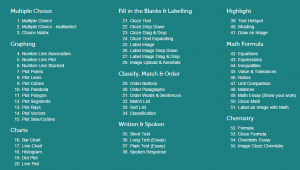ATP Conference 2016 – two interesting applications
During my visit at ATP-conference last week, two applications captured my interest: Learnosity and Metacog.
Learnosity is an assessment system that, in my humble opinion, takes Technology Enhanced Item types (TEI’s) to the next level. With 55 different templates for questions, it might be hard to choose which one best suites the situation, but it at least extends beyond the TEI’s most speakers mentioned (drag & drop, hotspot, multiple response and video). 
Learnosity can handle (simple) open math and open chemistry questions. That can be automatically graded. Nowhere near the extend that Maple T.A. can, but sure enough usable in lots of situations. It can create automatically graded charts (bar, line and point), graphs (linear, parabolic and goniometric) and has handwriting recognition. Interesting features that should come available in many more applications.
It must be said that handwriting recognition sounds nice, but as long as we have no digital slates in our exam room it can not be appreciated to the full extent (try writing with your mouse and you’ll understand what I mean). But being able to drag a digital protractor or a ruler onto the screen to measure angles or distances is really cool.
For me the most interesting part of this assessment system was the user friendliness. I need to dig deeper to see what we can learn from this system, but it sure is interesting.
Metacog is an interesting application, since it captures the process on getting to the final answer. You can run it while the student is working on a problem. It captures those activities that you define and afterwards you can have the system generate a report on these activities. Participation, behaviour, time on task and sequence of events are just a few of the reports that can be made. This is a very interesting tool to gain learning analytic data. And the system can be integrated onto any online learning activity. Here’s a video that can explain Metacog better.
[vimeo]https://vimeo.com/148498871[/vimeo]



Comments are closed.